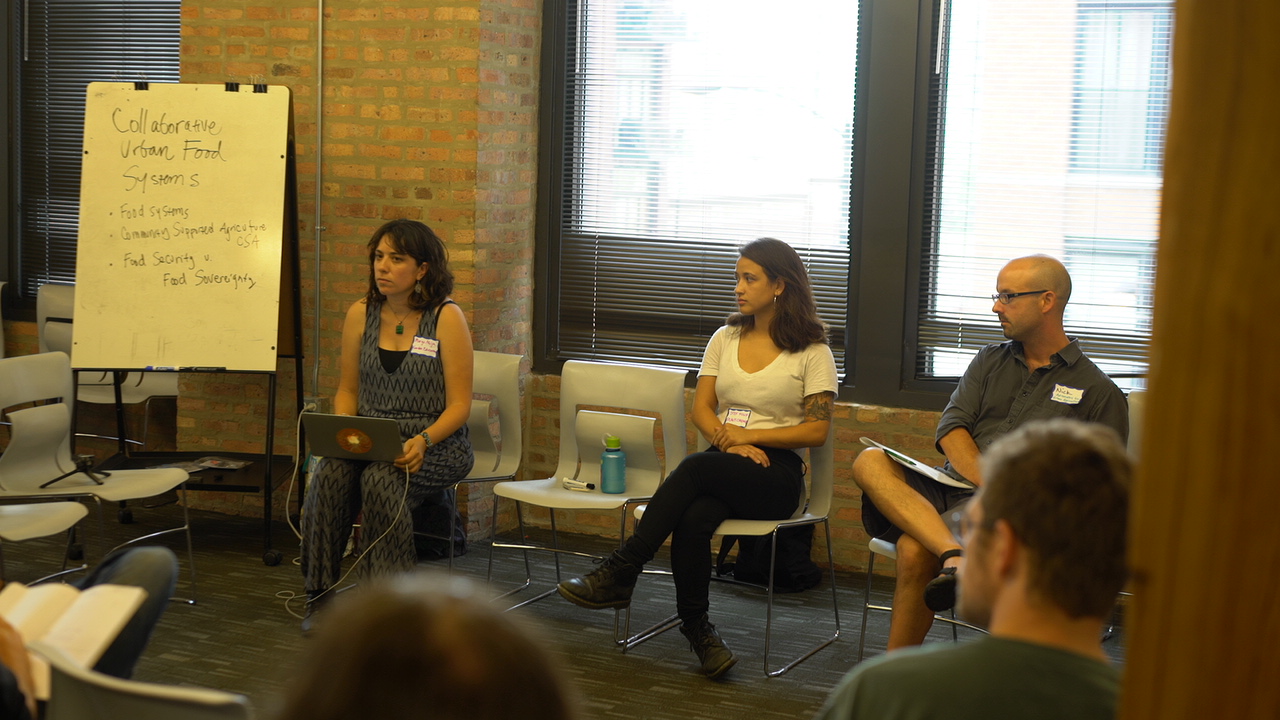Collaborative Urban Food Systems

- Group Introductions
- Margo teaches youth, and others, how to be agents in their own food system
- Steph stresses the importance of food sovereignty
- It is important for city kids to have connection with their food and where it comes from
- Food ownership is crucial
- Margo lays out the objectives (focused on fostering a more cooperative economy) for the hour:
- Understand the basic concepts about cooperative urban food systems
- Visions of urban food systems
- Concrete actions we can take to increase cooperation and collaboration
- Concepts
- What are food systems, in general?
- The production, marketing, processing, distribution, waste management of food
- How can we make this more of a closed loop?
- Less concern with marketing and distribution
- Instead, market from farmer to consumer directly
- What is community supported agriculture (CSA)
- Knowing your farmer
- Working directly with a farmer
- Paying a certain amount up front for a share of crops
- Helping farmers spread the risk of farming into the community—not solely on the farmer
- Helping farmers plan at the beginning of the seasons
- Quality and yield is dependent on farming conditions and weather
- What is the difference between food security and food sovereignty?
- Food security
- The availability of food, regardless of type, method or location of production
- One experiences food security if they have access to safe and nutritious foods that meet their dietary needs
- Food sovereignty
- The right of people and community to define their own agricultural, labor, and land policies that are ecological, socially, economically, and culturally appropriate for the community
- Control of how food is produced, distributed, etc.
- Democracy and decision-making in communities
- Deciding where their food comes from, etc.
- Interdependency between communities
- It is possible to be food secure, but not food sovereign
- Examples of food sovereignty:
- Havana, Cuba has a higher level of food sovereignty than most cities
- Doesn’t grow everything within city limits, but works with communities outside of the city
- Detroit, MI
- Boom in urban agriculture because economic situation forced them into this way of living
- Transition towns
- Transition towns encourage cooperative living and foster further cooperation in various ways
- Specifically, transitioning out of dependence on fossil fuels
- How are organizations encouraging cooperation?
- Steph:
- Plant Chicago is cultivating local circular economies
- Operates at zero waste – using a “waste station”
- Composts and recycles
- Waste stations remind folks that waste does not disappear, and forces people acknowledge and confront their waste
- Open-source data
- Goal to increase compost and decrease recycle and landfill waste
- Partnership with Link
- Gives underserved folks using Link a chance to access cooperatively grown/distributed, healthy foods
- Teaching people how to cook these foods
- Nick:
- Cannot rely on recycling alone
- Not everything recycled gets recycled
- There is no market for recycling
- Advocates for CSAs
- This is a great way to support urban food systems
- Pay-as-you-go model
- Some CSAs work on Link and EBT programs
- “Band of Farmers” is a resource that helps find a CSA near you
- AUA has a directory of all the urban farming going on in Chicago
- cuamp.org (register your community garden/farm too)
- Agriculture is all about capital
- For example, food distribution requires refrigerators and cold storage
- Because these tools are needed sometimes, but not other times, urban farms are working together to share these resources/labor
- Audience questions/comments/concerns:
- How to reach people on Link/SNAP benefits?
- Fair Share CSA coalition in Madison
- Work together to raise funds and accept SNAP benefits
- Encouraging folks to use those benefits at farmers market
- Inform them that this option is available
- What is the Chicago Market cooperative?
- Consumer cooperative
- Looking to be a full-service grocery store
- Wants to make a change in the food system
- Distribution is poor in Chicago
- Largest store in an urban environment
- Wants to influence those inside and outside of the city
- Anticipates accepting SNAP
- The Farm to School organization
- Paying farmers a fair wage for producing food and distributing to schools
- “Cosmetically imperfect seconds”
- Produce that would not sell at a co-op or farmers market, but is still acceptable to eat
- Getting this to public schools
- Garden, cooking, nutrition education for kids
- Actions we can take, ideas/models that are inspiring
- How can one get involved?
- Look up AUA directory
- Undocumented immigrants
- Farmers markets very strict
- Where should be put our energy? Should we build from the bottom or rely on the state?
- Build/strengthen the community
- Find out what is happening in your region
- Whatever makes the most sense the individual

